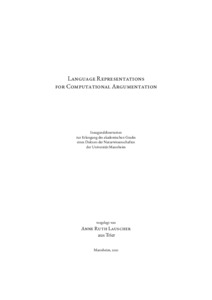|
Language representations for computational argumentation
Lauscher, Anne
![[img]](https://madoc.bib.uni-mannheim.de/60201/1.hassmallThumbnailVersion/dissertation_lauscher.pdf)  Vorschau |
|
PDF
dissertation_lauscher.pdf
- Veröffentlichte Version
Download (4MB)
|
|
URL:
|
https://madoc.bib.uni-mannheim.de/60201
|
|
URN:
|
urn:nbn:de:bsz:180-madoc-602012
|
|
Dokumenttyp:
|
Dissertation
|
|
Erscheinungsjahr:
|
2021
|
|
Ort der Veröffentlichung:
|
Mannheim
|
|
Hochschule:
|
Universität Mannheim
|
|
Gutachter:
|
Glavaš, Goran
|
|
Datum der mündl. Prüfung:
|
2 August 2021
|
|
Sprache der Veröffentlichung:
|
Englisch
|
|
Einrichtung:
|
Fakultät für Wirtschaftsinformatik und Wirtschaftsmathematik > Text Analytics for Interdisciplinary Research (Juniorprofessur) (Glavaš 2017-2021)
Fakultät für Wirtschaftsinformatik und Wirtschaftsmathematik > Information Systems III: Enterprise Data Analysis (Ponzetto 2016-)
|
|
Fachgebiet:
|
004 Informatik
|
|
Freie Schlagwörter (Englisch):
|
language representations , computational argumentation , multilinguality , ethics , natural language processing , transfer learning , word embeddings
|
|
Abstract:
|
Argumentation is an essential feature and, arguably, one of the most exciting phenomena of natural language use. Accordingly, it has fascinated scholars and researchers in various fields, such as linguistics and philosophy, for long. Its computational analysis, falling under the notion of computational argumentation, is useful in a variety of domains of text for a range of applications. For instance, it can help to understand users’ stances in online discussion forums towards certain controversies, to provide targeted feedback to users for argumentative writing support, and to automatically summarize scientific publications. As in all natural language processing pipelines, the text we would like to analyze has to be introduced to computational argumentation models in the form of numeric features. Choosing such suitable semantic representations is considered a core challenge in natural language processing. In this context, research employing static and
contextualized pretrained text embedding models has recently shown to reach state-of-the-art performances for a range of natural language processing tasks. However, previous work has noted the specific difficulty of computational argumentation scenarios with language representations as one of the main bottlenecks and called for targeted research on the intersection of the two fields. Still, the efforts focusing on the interplay between computational argumentation and representation learning have been few and far apart.
This is despite (a) the fast-growing body of work in both computational argumentation and representation learning in general and (b) the fact that some of the open challenges
are well known in the natural language processing community.
In this thesis, we address this research gap and acknowledge the specific importance of research on the intersection of representation learning and computational argumentation.
To this end, we (1) identify a series of challenges driven by inherent characteristics of argumentation in natural language and (2) present new analyses, corpora, and methods to address and mitigate each of the identified issues. Concretely, we focus on five main
challenges pertaining to the current state-of-the-art in computational argumentation:
(C1) External knowledge: static and contextualized language representations encode distributional knowledge only. We propose two approaches to complement this knowledge with knowledge from external resources. First, we inject lexico-semantic knowledge through an additional prediction objective in the pretraining stage. In a second study, we demonstrate how to inject conceptual knowledge post hoc employing the adapter framework. We show the effectiveness of these approaches on general natural language understanding and argumentative reasoning tasks.
(C2) Domain knowledge: pretrained language representations are typically trained on big and general-domain corpora. We study the trade-off between employing such large and general-domain corpora versus smaller and domain-specific corpora for training static word embeddings which we evaluate in the analysis of scientific arguments.
(C3) Complementarity of knowledge across tasks: many computational argumentation tasks are interrelated but are typically studied in isolation. In two case studies, we show the effectiveness of sharing knowledge across tasks. First, based on a corpus of scientific texts, which we extend with a new annotation layer reflecting fine-grained argumentative structures, we show that coupling the argumentative analysis with other rhetorical analysis tasks leads to performance improvements for the higher-level tasks.
In the second case study, we focus on assessing the argumentative quality of texts. To this end, we present a new multi-domain corpus annotated with ratings reflecting different dimensions of argument quality. We then demonstrate the effectiveness of sharing knowledge across the different quality dimensions in multi-task learning setups.
(C4) Multilinguality: argumentation arguably exists in all cultures and languages around the globe. To foster inclusive computational argumentation technologies, we dissect the current state-of-the-art in zero-shot cross-lingual transfer. We show big drops in performance when it comes to resource-lean and typologically distant target languages. Based on this finding, we analyze the reasons for these losses and propose to move to inexpensive few-shot target-language transfer, leading to consistent performance improvements in higher-level semantic tasks, e.g., argumentative reasoning.
(C5) Ethical considerations: envisioned computational argumentation applications, e.g., systems for self-determined opinion formation, are highly sensitive. We first discuss which ethical aspects should be considered when representing natural language for computational argumentation tasks. Focusing on the issue of unfair stereotypical bias, we then conduct a multi-dimensional analysis of the amount of bias in monolingual and cross-lingual embedding spaces. In the next step, we devise a general framework for implicit and explicit bias evaluation and debiasing. Employing intrinsic bias measures and benchmarks reflecting the semantic quality of the embeddings, we demonstrate the effectiveness of new debiasing methods, which we propose. Finally, we complement this analysis by testing the original as well as the debiased language representations for stereotypically unfair bias in argumentative inferences.
We hope that our contributions in language representations for computational argumentation fuel more research on the intersection of the two fields and contribute to fair, efficient, and effective natural language processing technologies.
|
 | Dieser Eintrag ist Teil der Universitätsbibliographie. |
 | Das Dokument wird vom Publikationsserver der Universitätsbibliothek Mannheim bereitgestellt. |
 Suche Autoren in Suche Autoren in
Sie haben einen Fehler gefunden? Teilen Sie uns Ihren Korrekturwunsch bitte hier mit: E-Mail
Actions (login required)
 |
Eintrag anzeigen |
|
